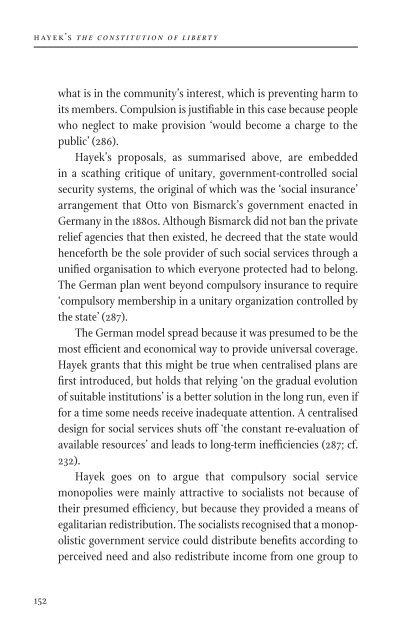Hayek's The Constitution of Liberty - Institute of Economic Affairs
Hayek's The Constitution of Liberty - Institute of Economic Affairs
Hayek's The Constitution of Liberty - Institute of Economic Affairs
You also want an ePaper? Increase the reach of your titles
YUMPU automatically turns print PDFs into web optimized ePapers that Google loves.
h ay e k ’ s t h e c o n s t i t u t i o n o f l i b e r t y<br />
s o c i a l s e c u r i t y, t a x a t i o n a n d t h e r e d i s t r i b u t i o n o f w e a lt h<br />
what is in the community’s interest, which is preventing harm to<br />
its members. Compulsion is justifiable in this case because people<br />
who neglect to make provision ‘would become a charge to the<br />
public’ (286).<br />
Hayek’s proposals, as summarised above, are embedded<br />
in a scathing critique <strong>of</strong> unitary, government-controlled social<br />
security systems, the original <strong>of</strong> which was the ‘social insurance’<br />
arrangement that Otto von Bismarck’s government enacted in<br />
Germany in the 1880s. Although Bismarck did not ban the private<br />
relief agencies that then existed, he decreed that the state would<br />
henceforth be the sole provider <strong>of</strong> such social services through a<br />
unified organisation to which everyone protected had to belong.<br />
<strong>The</strong> German plan went beyond compulsory insurance to require<br />
‘compulsory membership in a unitary organization controlled by<br />
the state’ (287).<br />
<strong>The</strong> German model spread because it was presumed to be the<br />
most efficient and economical way to provide universal coverage.<br />
Hayek grants that this might be true when centralised plans are<br />
first introduced, but holds that relying ‘on the gradual evolution<br />
<strong>of</strong> suitable institutions’ is a better solution in the long run, even if<br />
for a time some needs receive inadequate attention. A centralised<br />
design for social services shuts <strong>of</strong>f ‘the constant re-evaluation <strong>of</strong><br />
available resources’ and leads to long-term inefficiencies (287; cf.<br />
232).<br />
Hayek goes on to argue that compulsory social service<br />
monopolies were mainly attractive to socialists not because <strong>of</strong><br />
their presumed efficiency, but because they provided a means <strong>of</strong><br />
egalitarian redistribution. <strong>The</strong> socialists recognised that a monopolistic<br />
government service could distribute benefits according to<br />
perceived need and also redistribute income from one group to<br />
another, as might seem desirable. <strong>The</strong>se compulsory monopolies<br />
were represented to the public as ‘social insurance,’ but this claim<br />
was deceptive.<br />
Insurance, properly speaking, grants protection only to those<br />
who can claim it through their contributions. Monopolistic social<br />
security programmes, by contrast, enrol those who have not<br />
yet had time to establish a claim. People receive ‘as a matter <strong>of</strong><br />
right what they have only to a small extent paid for.’ Benefits are<br />
not limited to a contractual amount, or even to some necessary<br />
minimum, but reflect a political judgement as to an amount that<br />
would be adequate, regardless <strong>of</strong> a person’s need or contribution.<br />
Unlike genuine insurance, government plans can transfer income<br />
from one group to another. Pension claims, for example, are paid<br />
out <strong>of</strong> the taxes <strong>of</strong> those currently working, and not from income<br />
on capital set aside to honour these claims. Wealth is thus transferred<br />
from the young and productive members <strong>of</strong> society to the<br />
elderly, a result which leads Hayek to speculate that the burden on<br />
the young may in the future become greater than they are willing<br />
to bear (288–9, 292 and 295–7).<br />
Hayek gives several reasons why unitary state systems <strong>of</strong> social<br />
security, as they have developed everywhere, pose a critical threat<br />
to freedom. First, these programmes are necessarily coercive.<br />
<strong>The</strong>y designate government as the monopoly provider <strong>of</strong> certain<br />
services and give administrators broad discretion to distribute<br />
benefits to individuals according to what they are thought to<br />
deserve. Systems <strong>of</strong> state medicine transform doctors into paid<br />
servants <strong>of</strong> the state, subject to instruction by authority as to<br />
the provision <strong>of</strong> medical services (288–90, 300). Second, these<br />
programmes are at odds with a healthy democracy. This is partly<br />
because their very complexity defeats democratic deliberation<br />
152<br />
153












